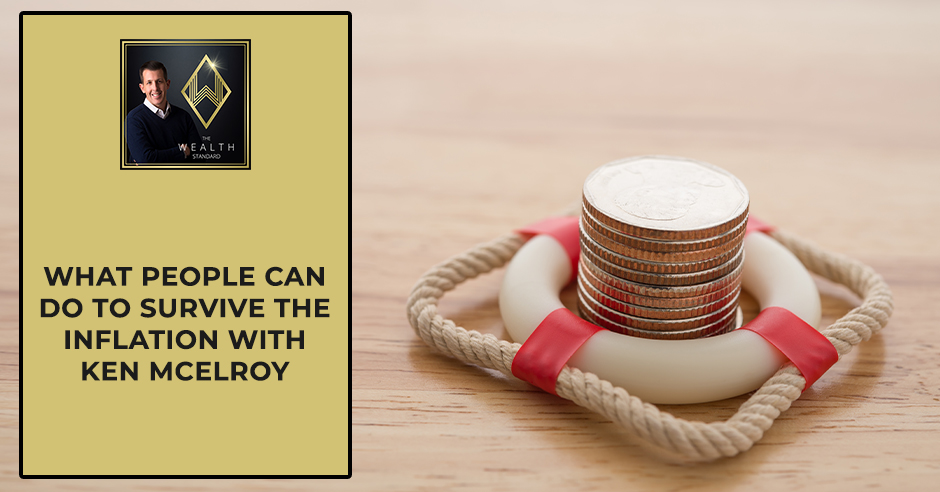
Podcast: Play in new window | Download

While the government’s efforts to provide stimulus packages to answer the economic issues that are happening due to the pandemic, it’s not a sustainable solution. The country is still dealing with more unemployment, and companies and businesses are facing the threat of inevitable inflation. In the first part of this interview, Ken McElroy of MC Companies sat down with Patrick Donohoe to share his investment philosophy to help people prepare for possible future opportunities in the real estate market. Today, they discuss what people can do to be on the right side of things and survive inflation: study what’s happening, gather the funds, and invest in the right stuff.
—
Watch the episode here:
Listen to the podcast here:
What People Can Do To Survive The Inflation With Ken McElroy
Thank you for reading part two of an awesome interview with a real estate investment icon, Ken McElroy. If you didn’t read the last interview, go check that out, that’s part one, it will help create some context to what we’re talking about. It’s a singular topic and it’s focusing on the economy and the influence of the effect the economy is going to have on American wealth and finance and investments. I’m wrapping up a two-day financial advisor online summit that I hosted. I’m glad you’re here and you’re willing to learn. Kenny is an amazing guy. Go check out his website, go check out his books and his YouTube channel.
Let me give you a little bit of a preface before we get into this interview. The objective I took when coming up with interview questions and so forth was to bring out Ken his perspective of the economy. What’s going on? What is being done where we haven’t seen necessarily the impact yet, but we’ll see the impact in the future? There’s a lot going on right now. We try to focus on what’s going on in two areas. I believe that these are the two primary influences of the economy. Number one is monetary policy, which is the set of objectives the Federal Reserve takes to establish the reasoning behind their activities.
Second is fiscal policy. Fiscal policy is the stance the government takes, especially the administration that has the influence on how it is going to accomplish its agenda through laws, through spending bills, through modifications, through the Tax Code. The reason I’m wanting to do this is that it’s clear based on the narrative, the activities are forthcoming, they’re happening and will happen over the coming years, but the activities are in motion. The impact it’s going to have on the economy is that there’s going to be more inflation and there are going to be higher taxes. I’m not going to get into the reasons and details, Kenny and I get into some of it, but there are important details in here that I do not want you to miss. That’s why I’m going through this little monologue so I can establish context for you.
Number one, inflation is the agenda, the purchasing power of your money, which means that the money you have right now buys many things, it will buy less in the future. That’s what inflation is. You also have taxes. Taxes, whether it’s on spending, taxes on investments, taxes on gains, taxes on income, are going up, they have to go up. It’s clear based on the narrative that’s already being set, that they are going to push forth activities to make modifications. It’s important to understand what impact it’s going to have on your specific wealth. Right now, American wealth is set up to be harmed by what’s to come. Hopefully, you extract out of Kenny some nuggets so that you can start positioning your investment strategy, your wealth strategy, your business strategy, your pursuit of financial independence strategy accordingly because these things are coming and we have to navigate around them if we want to be successful. Thank you for learning again. I hope you enjoy the second part with my friend, Ken McElroy. Thank you. Take care.
—
Let’s move to the last point of the economy, because that is going to determine a lot of what’s going to happen, and it’s already happening. There are things that are in motion that haven’t necessarily manifested yet. How the economy is now is in large part stimulated by the government. What do you see is happening? Obviously, you don’t have a crystal ball, but you’ve experienced market’s ups and downs cycles enough where there are probably some leading indicators. What are the Feds doing? Will they continue to do? What are some of the variables that need to happen when they stop doing it?
First of all, things are going to unravel as you know. The Federal Reserve cannot continue to spend this much money on that. They have to let things emerge. There might be new tax incentives and new stimulus packages and all that stuff to make it a soft landing for people, for businesses. They’re all trying to figure that out. We’re not out of the woods yet on that side of it, but once the vaccine gets rolled out and things start getting a little safer, I don’t think we’re going to go back to the way we were, but there won’t be any longer an excuse to not go into the office and to move forward. It’s going to be a personal decision. I don’t want to go down that road because that is what it is. People decide what they want to decide. The point is that right now the Coronavirus is the reason. When that goes away, then the government is not any longer palpable, “You’re at home, here’s some cash.” We’re now back to an even playing field. Now, it’s up to you. There will be some cash available for people and some things that we’re going to have to do. What the governments are afraid of is homelessness, and that’s a big one. They’re afraid of things like food shortages and those kinds of things. They’re going to be focused on those kinds of things.

Surviving The Inflation: Inflation is inevitable because we pumped all this cash into the system.
As opposed to putting money in people’s pockets.
They’re going to maybe do that with the minimum wage and maybe some additional stimulus, but that doesn’t go far. $1,200 to somebody will give them a couple of months. I’m not saying that’s not good. I’m saying that at some point, you can’t continue to do that. It all leads to inflation of some kind. When you raise the minimum wage, what it does is squeezes the profit margin on a business that’s already in trouble. A restaurant as an example that got kicked out now has higher wages. All of that stuff turns into higher prices. A lot of people might disagree with me, but I don’t know how you can’t pay more people more money, and then you’re going to have businesses, either reducing employee, go to halftime, they’re going to try to run a little leaner or maybe the owner gets more involved, but potentially it’s going to create either more unemployment or prices are going to rise if they can.
That’s what’s interesting is you had businesses get the crap kicked out of them for a year. Instead of getting things back, filling their coffers again, now they have to pay out more money to employees, so their only option is to either take less money or raise their prices. Is it going to lead to not just what normal inflation would be if you had a normal economy pre-COVID and you raise the minimum wage? You’d have some inflation, but now the likelihood is a lot higher. Do you see the economy being able to support a lot more inflation? I know that’s subjective.
I’ve been trying to wrap my head around this. Our good friend, Andy Tanner, I bet he’s here more than you know, trying to figure this out because he is a massive student of this. We were in Japan together. We were talking with Robert Kiyosaki and we were there on Rich Dad. People are saying they’re on like QE 30 or something crazy. Their GDP is the highest in the world, and yet they’re not seeing this massive inflation. I call them up, “Andy, when we were in Tokyo, how can the government continue to pour all this cash into an economy, and then not see it?” What he described to me, which I thought was a good example. This is Andy, and I’m still learning like all of us, he said that the balloon has been inflated and the government has been putting money in and the balloons inflated to what it is. It could be gas prices, food prices, real estate. It’s not all just an inflation number. Everything’s a little bit different. He said that there’s a hole in it and that’s deflationary.
Take a look at the numbers, follow the math, and then try to be out in front of it. Click To TweetThere are things that could be potentially deflationary, but they keep putting money in it to keep it at its size. That’s what’s happening now. We do have inflation on things. This phone here when I bought it, it’s worthless. I get more. That’s an easy thing to pick on. There are things that are deflationary and there are things that are inflationary, and it’s all bundled together. I do believe that we’re going to have inflation because we pumped all this cash into the system. There are going to be more goods chasing those things at some point in time.
What are some final thoughts you have in regard to the state of things and the individual investor in mind, and how they can stay even-tempered? You have the Bitcoin soaring, the crypto craze, you have the GameStop and you have forums that are trying to short squeeze some of the big, short positions that are out there. There’s a lot of buzzes. What do you do to maintain an even keel temperament? What do you talk about frequently with investors that sometimes get off the rails because of the craziness?
There’s a bunch of things. One, it’s a horrible time for a lot of people, and that’s inevitable and there’s not a darn thing we can do about it. What you can do is you can start to study what’s happening and you can be on the right side of that, whatever that is. I mentioned that with my trainer, “No one invests a bunch of money now because you’re going to have a bunch of gyms goes out of business in the next several years. Go find out what funds those are and figure that out.” It’s a long-term strategy. People, generally, like things quick and easy. Bitcoin, GameStop, that’s lazy man’s money. It’s easy to throw money into that and then watch it. That is not investing in my opinion. That’s speculative in its biggest nature. You can go online and there will be tons of people that say this is a certainty. There’s nothing certain except debt and taxes, even real estate isn’t certain.
The one thing I love about real estate is if you look at the numbers, and I thought and did this in 2008, I went through this ‘08, ‘09, ‘10, massive people dumped out of housing, out of mortgages, and they dumped into rental housing and they put this incredible pressure on rental housing. Then it moved back out again and that’s where we are. Take a look at the numbers, follow the math, and then try to be out in front of it. This is going to be the biggest transfer of wealth that we will see in a long time. That could be wrong, I don’t know what the future is going to be like. In my lifetime, this is it. This is a time that you need to have the education and be out in front of that stuff, and then put together your team so that you can go out and do things.
There are many things happening. It’s right in front of us. The hotel businesses are closed, the micro hotels especially. Nobody is going to those, nobody is paying those. There is nobody traveling. I was on the phone with my friend that owns a bunch of it. He’s getting killed, 10%, 20%, 30% occupancy. There are already funds being put together to buy those and convert those to housing. That’s what I’m talking about. All of this is right in front of you. There are people already swirling around the malls, looking at redevelopment. That’s real estate, it is what it is. You’ve got to pay attention to those kinds of things and ask a lot of questions and get educated.
Kenny, we could probably talk for a few more hours. I have 10 million questions, but let’s do this. I know you have some new digital resources that you are making available to people that teach a lot of these types of principles. Would you speak to that as we end the interview?
This has been the greatest part of the pandemic for me. I haven’t been a big social media guy or a big YouTube guy. I’ve been trudging along on real estate and buying real estate. We have 250 employees and we’re busy and flying all over the place looking at stuff. The pandemic, I was like, “I’m going to get camera crews here and I’m going to start teaching.” We started teaching in March 2020, I start putting these YouTube videos out. Now we’re up over 200,000 subscribers. We started doing these videos to help people and we put them on our website, KenMcElroy.com. It’s been great. We put out a masterclass that people could get. They can subscribe to these videos of stuff they are interested in and learning some of the things. We have a forum that people can go and talk to other members. We have thousands of people helping people now, which has been great. It’s all been collaborative. The premium membership is $19 a month. That’s $200 for a year and you could go look at all these different videos and all these what we’re talking about and get educated and learn. That’s the key to this next step.

Surviving The Inflation: Start to study what’s happening so you can be on the right side of whatever that is that you’re investing on.
Sometimes chaos is the mother of invention. I know it was always out there for you because you always have been teaching, but what a great opportunity to pivot a little bit. I know there are people that rave about some of the stuff that you’re doing. Kenny, you’re amazing. Thank you for what you do. Thanks for teaching people. Thanks for your time. We’ll have to do this again, maybe as to 2021 comes to an end and 2022 starts to rear its head, and we’ll see whether it’s ugly or pretty.
It’s going to be an interesting time. People have some hope, you can be on the other side of this. It’s going to be some rough roads, but you can be on the other side of it.
I appreciate that, Kenny. Thanks again for teaching us. We’ll talk to you next time.
Patrick, good chatting with you.
Important Links:
- Ken McElroy
- Previous Interview with Ken McElroy
- YouTube – Ken McElroy
About Ken McElroy

Love the show? Subscribe, rate, review, and share!
















